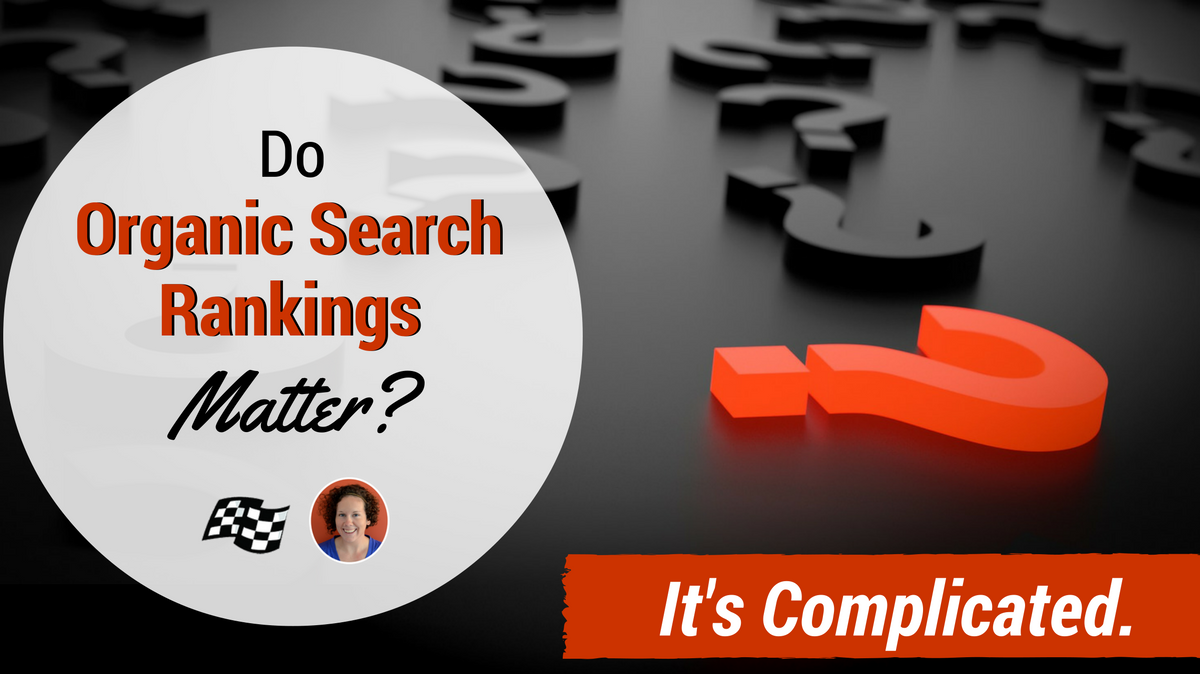
If you haven’t already heard, rankings are a thing of the past. Yep, you read that correctly. (If this makes you furious, keep reading.)
It used to be that organic rankings were the bee’s knees of web marketing. The tactics used to get a front row seat in the search results were quick and easy. As both search engines and searchers became more informed about how to use the web in order to get the end result they wanted, the evolution began. Simple tactics like getting a ton of links to your website with the same anchor text became less effective and eventually punishable by death. With this evolution came better search results. Rankings became a byproduct of websites that offered value to visitors and provided them with the information and experience they were looking for.
Ok, so rankings still matter, but they aren’t the only thing that matter anymore.
Why Rankings (Alone) Don’t Matter
Today, it’s almost impossible to rank by having a singular approach.
If you speak the language of your audience in your meta descriptions but don’t have a well-rounded approach for optimization, you won’t get rankings.
If you have the gift of writing eloquent, keyword rich title tags, but don’t have a well-rounded approach to your optimization, you won’t get rankings.
Let’s do a little experiment.
I’m planning a trip to Banff National Park this summer, and I’m looking for a hiking backpack to carry all the stuff I might need for 8-10 hours in the mountains. I learned from my trip to Rocky Mountain National Park that temperatures fluctuate vastly in the span of 8 hours — especially when your ascending and descending.
Let’s start my search process:
First, I’m going to search for “backpacks”.
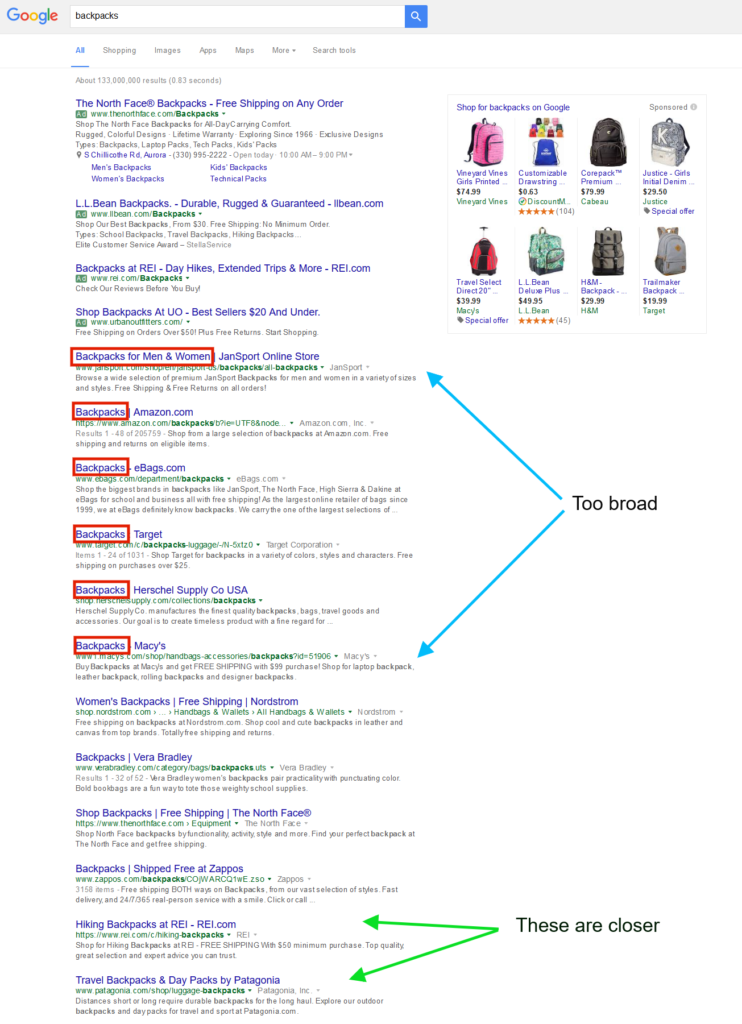
Notice, the results at the top are more general. My search was general, so I’ve come to expect that my search results should match my intent. This is part of the evolution of search. Google doesn’t know that I’m looking specifically for a hiking backpack because I didn’t indicate that in my search query.
If I were just beginning to build my knowledge base of all things backpacks, I might not know that hiking backpacks existed. Thus, my search would be for backpacks. However, as search has evolved to take searcher intent into consideration, so has the knowledge of the searcher. Before doing this, I knew that searching for “hiking backpacks” and “backpacks” would each return a unique set of results. So, let’s start my search over assuming I knew I wanted to look specifically at hiking backpacks.
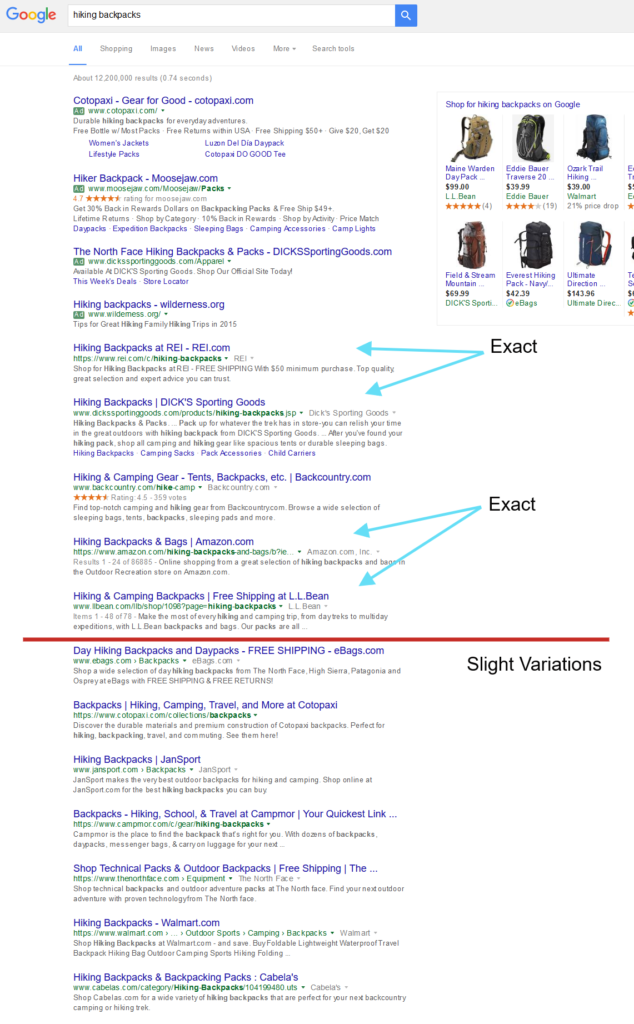
Notice again, the top results are an exact match of my search results. The further down the page we go, the more variation we see. Ok, so let’s just make all of our title tags our keywords and call it a day! Not so fast.! That’s actually an old-school SEO tactic that doesn’t always work.
Allow me to prove it. Let’s dig a little deeper and continue our experiment..
The Role of Title Tags and Meta Descriptions
Since I know a little more about hiking backpacks than I first let on, let’s do another search and add another modifier to get more specific. I’m only going to be doing day hikes, so I won’t need a big backpack that someone doing a multi-day hike would need. Small hiking backpacks are often called daypacks.
Let’s search for “hiking daypacks”.
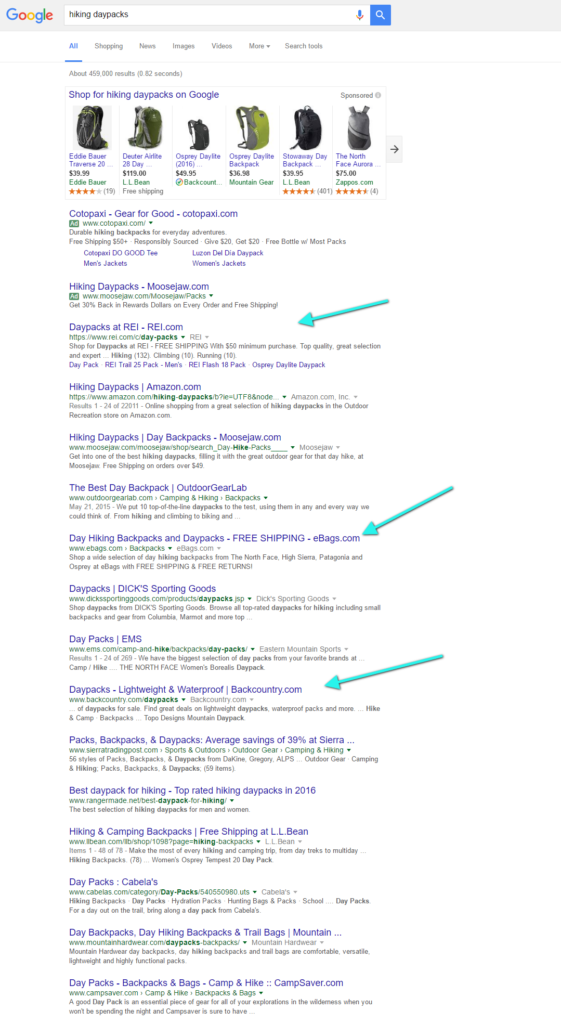
Notice how when we get more granular in our search query, the search results have more variation. As a searcher, I like the search results that work some of the benefits into the title. In this example, you see one result mentions “Free Shipping” (I’m always looking for free shipping) and another mentions “lightweight and waterproof” (both big benefits since I’m going to be carrying it all day and know the weather can be finicky).
Since title tags and meta descriptions both have a character limit before getting cut off, you should optimize both to be within the limit. As a searcher having no prior bias, I would probably click on the eBags.com result. Not only does the title give me information that they have free shipping, but the meta description gives me additional valuable information. It tells me they carry some of the brands I’ve come to respect and also that they offer free returns, on top of free shipping (added bonus). The first search result doesn’t necessarily get the most clicks. Writing a keyword-rich and benefit-focused title tag and meta description are helpful elements in catching the interest of searchers.
However, Google uses many different factors to rank websites in search results. Some of the components they have mentioned explicitly while others are more implicit.
Frustration Sets In
Let’s take the next step in our experiment and click on the eBags.com result.
Here is the landing page we are taken to:
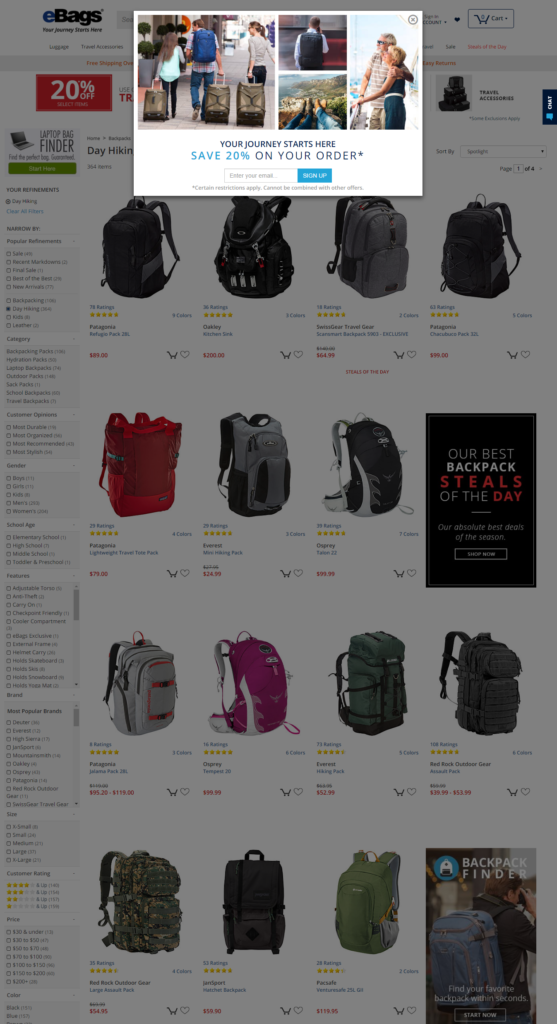
The first thing you’ll notice is the pop-up offering the visitor savings if they share their email address. I’m not a big fan of these because it seems like a forceful initial interaction. I’ve never been to this website or even heard of this company and the first thing they want is my email address so they can add me to their mailing list and send me what I assume will be promotional emails. I don’t mind being on a mailing list, but I’m selective about giving out my email. I want them to earn it with good customer service, great products and personalized branding. I’ve seen pop-ups much worse than this one. At least this one is easy to close out of by clicking the X in the upper right hand corner.
Once I do that, I start scrolling down the page and find a pack I like — the Kelty Redwing 40 Women’s Hiking Backpack. I click on that product and it takes me to the product landing page.
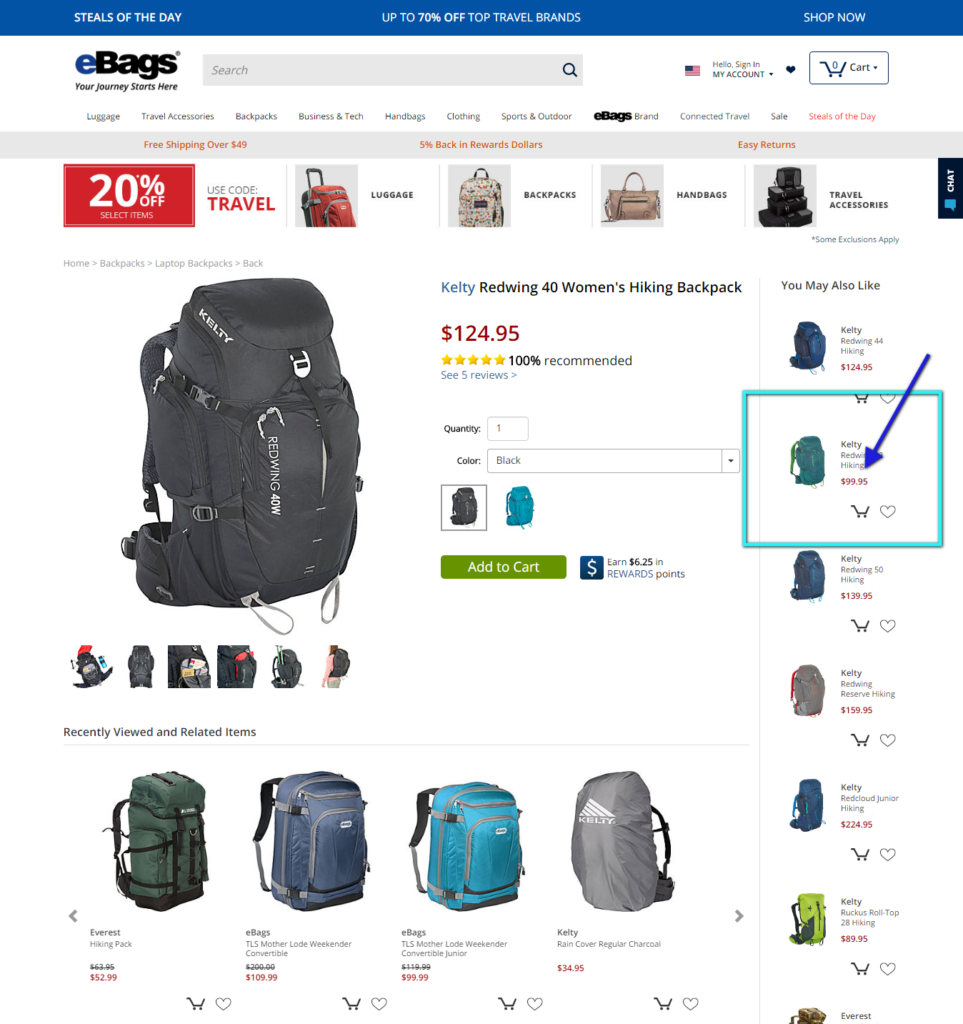
I read through the product description and some of the reviews. Seems like a good option for me, but I’m just beginning to look, so I want to see what other options they have. When I click back to the main hiking backpack category page that I came from, I’m prompted again with the email pop-up. That’s annoying!
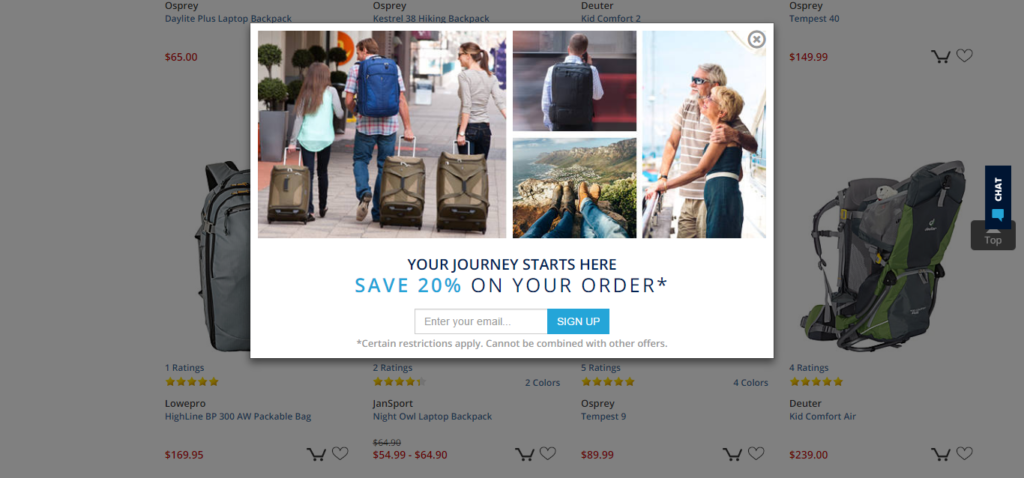
At this point, I’m frustrated with my experience. It’s one thing to show me the pop-up when I initially come to the site. It’s another to continue to show me the pop-up while I browse the site, every time I navigate to a different page. Now I really feel like they’re trying to force me to give them my email. If they are this demanding in the process of trying to get my email, I can’t imagine what it’s like when they actually have it. Are they going to send me emails multiple times a day? I’m out.
Going back to the search results we can see that eBags is in organic ranking position number 5. Not a bad ranking at all.
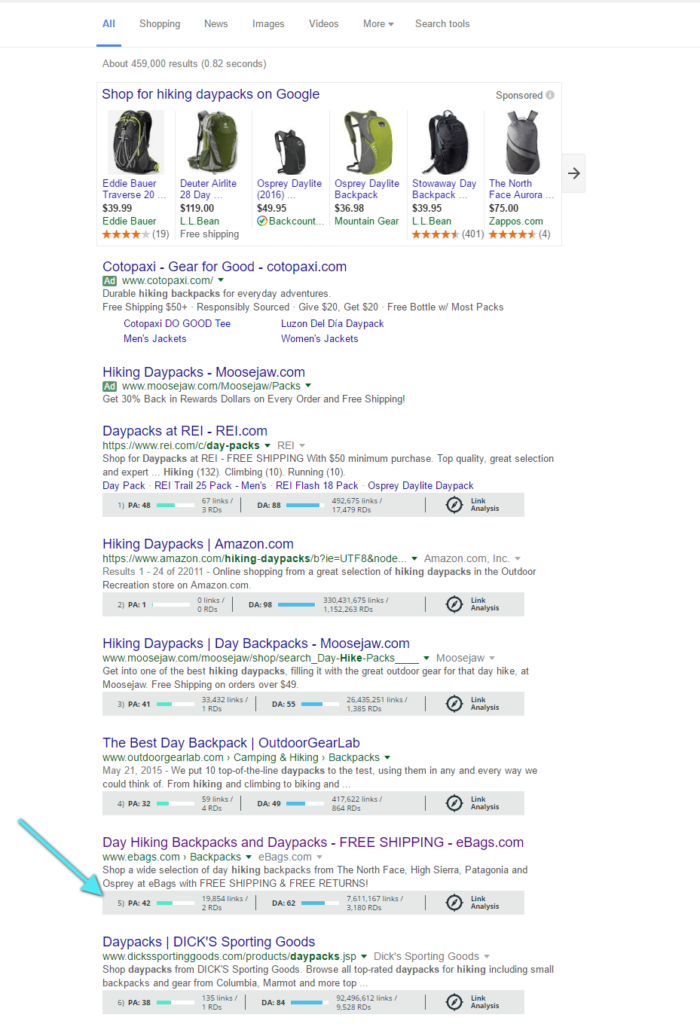
Their title tag and meta description earned my click among all the other results. Yet, my experience on their site was frustrating and I ended up leaving without giving them my money or my email address. So, what does a good ranking get them? Nothing from me – and likely other visitors to their site have a similar experience and chose the same end result.
Get and Keep Rankings
As search engines have collected more data and become more sophisticated, they’ve been able to provide searchers with a better experience. The relationship between search engines and searchers has become more integrated. Studies have shown a correlation between engagement metrics (time on site, bounce rate and page views) and Google search results. Instead of Google solely relying on a site’s backlink profile, including link anchor text and keyword-stuffed content, it is looking at metrics that can’t be as easily manipulated. SEO’s now have to use a more well-rounded and human approach to positively impact engagement metrics.
As my example shows, title tags and meta descriptions still have some weight in getting searchers attention and clicks, but if their experience on your site is less than they desire and/or they don’t find the information they are looking for, they’ll leave without converting and your ranking on the first page will have little impact on your bottom line. Aside from that, it might not be long until Google determines that users aren’t engaging with your site – when they see high bounce rates, low time on site and page views — and as a result lower your rankings.
It’s time to assess your SEO strategy from all angles and take advantage of every opportunity to make the best experience for your audience. In doing so, your site can be rewarded with good rankings as well as increased traffic and conversions.
